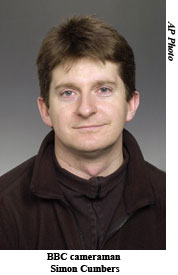SAUDI ARABIA
JANUARY 8, 2005 Posted: January 27, 2005 Mohamed al-Oshen, Al-Mohayed IMPRISONED Al-Oshen, editor-in-chief of the Riyadh-based Islamist weekly Al-Mohayed, was detained on January 8 by Saudi security forces. A local source told CPJ that Al-Mohayed had recently published material that harshly attacked the Saudi government, as well as articles that criticized it for not taking…

BBC Cameraman killed in Saudi Arabia
New York, June 7, 2004—The Committee to Protect Journalists (CPJ) mourns the death of BBC cameraman Simon Cumbers, 36, who was shot to death yesterday by unidentified gunmen near Riyadh, the capital of Saudi Arabia. BBC security correspondent Frank Gardner, 42, was also critically injured in the attack. The shooting occurred in Al-Suwadi, a suburb…
Attacks on the Press 2003: Saudi Arabia
Since the September 11, 2001, attacks on the United States, , ATTACKS ON THE UNITED STATES, Saudi Arabia’s rigid press has exhibited spurts of uncharacteristic independence, reporting on once taboo topics such as crime, unemployment, and even the problem of religious militancy in the kingdom. However, these welcome displays of openness in one of the…
Your Royal Highness: The Committee to Protect Journalists (CPJ) condemns your government’s harassment of Wajeha al-Huwaider, who writes for the Arabic-language daily Al-Watan and the English-language daily Arab News. CPJ sources confirmed that the Information Ministry issued directives in late August effectively barring al-Huwaider from publishing her work in Al-Watan and Arab News. This action…
New York, July 30, 2003—The Committee to Protect Journalists (CPJ) condemns the Saudi Arabian Information Ministry’s decision to ban Saudi writer Hussein Shobokshi from writing his weekly newspaper column. According to a July 29 Reuters report, Shobokshi received a call from his editors at Okaz, the Saudi daily that published his weekly columns. “I got…
Your Royal Highness: The Committee to Protect Journalists (CPJ) is concerned by the dismissal this week of Jamal Khashoggi from his job as editor of the Saudi daily Al-Watan. On May 27, the government removed Khashoggi from his post without explanation, according to international media reports. His dismissal came in response to Al-Watan’s provocative editorial…
Attacks on the Press 2002: Middle East and North Africa Analysis
The Arab world continues to lag behind the rest of the globe in civil and political rights, including press freedom. Despotic regimes of varying political shades regularly limit news that they think will undermine their power. Hopes that a new generation of leaders would tolerate criticism in the press have proved illusory, with many reforms…
Attacks on the Press 2002: Israel and the Occupied Territories (Including the Palestinian Authority Territories)
While the press is largely free within Israel proper, the country’s military assault on the Occupied Territories fueled a sharp deterioration in press freedom in the West Bank and Gaza during much of 2002. Despite vocal international protest, the Israel Defense Forces (IDF) committed an assortment of press freedom abuses, ranging from banning press access…